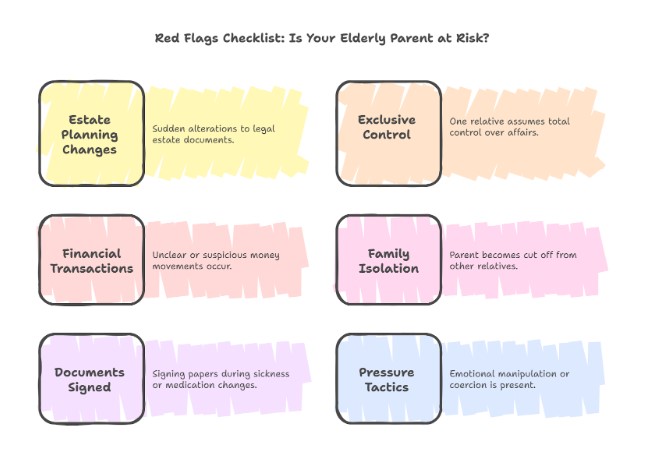

Originally published: July 2025 | Reviewed by Mary Conte
When a loved one betrays your trust, the damage runs deeper than financial loss—it tears families apart.
This real-life case from Winter Park, Florida, reveals how we helped one woman protect her parents’ legacy and challenge a fraudulent power of attorney created under suspicious circumstances.
(Names changed to protect client privacy)
Sarah* never imagined she’d be fighting her own sister in court while grieving the loss of both parents.
But that’s exactly what happened when she discovered that her sister had created a power of attorney (POA) for their elderly father just months before his death, knowing he had Alzheimer’s disease and their mother was severely depressed from years of caregiving.
By creating the POA while their father was cognitively impaired and using it for personal financial gain, Sarah’s sister crossed both legal and moral boundaries.
This heartbreaking situation is more common than you might think across Central Florida communities from Lakeland to The Villages, from Kissimmee to Clermont.
Sarah wasn’t just grieving her parents—she was battling her own sibling in court to protect what was left of their legacy.
When elderly parents become vulnerable due to illness or grief, unscrupulous family members sometimes take advantage of their weakened state to gain control of their assets.

Sadly, these warning signs are often dismissed or misunderstood until it’s too late. Here’s what Sarah noticed—and what you should look out for:
In Sarah’s case, several red flags should have raised concerns:
If you have elderly parents in Central Florida, be alert for these warning signs:
In Florida, a power of attorney (POA) is only valid if the person signing it—the “principal”—has the mental capacity to fully comprehend what they’re doing at the time of signing.
That means they must clearly understand:
This legal standard is especially critical when the person has a diagnosis like Alzheimer’s disease or another form of dementia.
While cognitive conditions often fluctuate, with so-called “good days,” Florida courts focus on the principal’s capacity at the exact time of signing.
If the disease has progressed, even subtly, the individual may lack the legal ability to execute such a document, even if they seem alert for brief periods.
Bottom line: A power of attorney signed during cognitive decline—without clear capacity—can be declared invalid.
Even when a person technically has capacity, a POA can still be invalid if it was signed under undue influence—a legal term used when someone uses their position of trust or authority to manipulate an elderly or vulnerable individual into making decisions they wouldn’t otherwise make.
This is most common in caregiving situations, where the lines between help and control can blur.
Undue influence may exist when:
In the eyes of Florida law, influence becomes undue when it overpowers the elder’s free will and replaces it with someone else’s agenda.

We didn’t wait. Within days, we launched a full-scale legal response—reviewing documents, requesting medical records, and initiating probate intervention.
When Sarah came to our office in Central Florida, we knew we had to act quickly. Here’s what we did:
1. Document Review: We carefully examined the power of attorney and all related documents, looking for signs of fraud or invalid execution.
2. Medical Investigation: We gathered medical records to prove her father’s mental incapacity at the time he supposedly signed the POA.
3. Financial Analysis: We worked with a forensic accountant to trace asset transfers and identify misuse of funds.
4. Adult Protective Services Report: We filed a report with Adult Protective Services for potential financial elder abuse.
5. Probate Court Action: We initiated probate proceedings to secure estate assets and prevent further misuse.
Challenging a power of attorney requires solid evidence. We gathered:
Proving a person’s mental state retroactively isn’t just difficult—it’s one of the most challenging aspects of elder law litigation.
Sarah’s sister had moved money, closed accounts, and deleted emails. We had to reconstruct years of financial activity with subpoenas and expert analysis.
We worked with medical professionals to:
Sarah’s sister had controlled most of her parents’ financial information, making it challenging to track asset transfers.
We used legal tools to:
Fighting these cases is emotionally draining and financially challenging. We helped Sarah by:
In the end, justice was served not only for Sarah but for her parents, whose wishes were finally honored. The court recognized the POA as invalid, and the estate was preserved.
we successfully:
This case highlights the importance of families throughout Central Florida, from Four Corners to Ocoee, from Pine Hills to Poinciana, having honest conversations about estate planning before a crisis arises.
In Florida, there are strict time limits for challenging the abuse of power of attorney. Don’t wait if you suspect problems.
The sooner you act, the better your chances of:
If you’re facing a similar situation in Central Florida, you may be able to:

If you have elderly parents in Lakeland, Winter Garden, St. Cloud, or anywhere in Central Florida, watch for these warning signs:
If even one of these warning signs applies to your family, it’s time to talk to a qualified elder law attorney before further damage is done.
When families plan together—before crisis hits—they’re more likely to preserve relationships and protect assets from misuse.
The best way to prevent power of attorney abuse is to have open, honest conversations about estate planning while your parents are still healthy.
This includes:
Working with Mary Conte at Conte Mollenhauer Law Firm can help ensure that:
If you suspect power of attorney abuse in your family, contact Mary Conte at Conte Mollenhauer Law Firm immediately at 321-216-9381. Time is critical because:
When you meet with Mary Conte about suspected power of attorney abuse, bring:
Challenging a power of attorney is complex legal work that requires:
Mary Conte at Conte Mollenhauer Law Firm has the experience and expertise to handle these complex cases throughout Central Florida.
If you’re facing a situation similar to Sarah’s, don’t let fear or uncertainty stop you from seeking help. Contact Mary Conte at 321-216-9381 or visit www.marycontelaw.com to discuss your case.
Whether you live in Clermont, Apopka, or Kissimmee, power of attorney abuse can happen quietly. Don’t let it go unchecked—schedule a confidential consultation today.
Power of attorney abuse is a serious problem that affects families throughout Central Florida. But as Sarah’s case shows, it’s possible to fight back and achieve justice for vulnerable elderly parents.
The key is recognizing the warning signs early, gathering strong evidence, and working with an experienced attorney who understands the complexities of these cases.
While the legal process can be challenging, the peace of mind that comes from protecting your parents’ legacy and holding wrongdoers accountable is invaluable.
If you suspect power of attorney abuse in your family, don’t wait. Contact Mary Conte at Conte Mollenhauer Law Firm today at 321-216-9381 or visit www.marycontelaw.com to discuss your options and protect your loved ones’ interests.
This article is for informational purposes only and does not constitute legal advice. Every situation is unique, and you should consult with a qualified attorney about your specific circumstances.